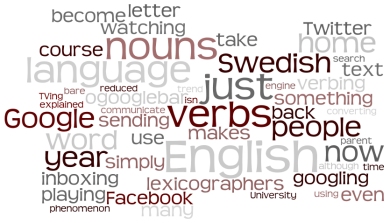Diary date: 3rd November, 1985
It’s the Autumn of 1985 and I’m back at university again, this time for year 2 of my 4 year course. I leave my parents at home with a promise to call or send a letter soon, but with so many student distractions to get reacquainted with, it will be a while before I’m in touch.
If I didn’t pen many letters back then, I write even fewer now. All but the most formal have been replaced by text messages, Facebook, Twitter and the rest.
In fact, we’re in such a rush to communicate these days that we’ve even reduced the words we use to describe these activities to the bare minimum. Sending a text message is simply texting, just as contacting someone on Facebook is now Facebooking or inboxing them. Tagging a tweet on Twitter involves hashtagging and sending an email is obviously emailing. Linking up with people is friending, and falling out with them again is described by the Oxford University Press word of the year of 2009: unfriending. And of course searching online is now amply covered by the ubiquitous idea of googling.
It all makes you wonder why sending a letter never quite managed to become lettering, and why watching TV isn’t just TVing or tellying (although in our own linguistically progressive household, it has recently been shortened to simply ‘watching’ – just as standing in front of a mirror preening yourself has become ‘vaining’).
What’s happening here is something that English has a proud tradition of doing with gay abandon, and that’s ‘verbing’ – converting nouns to verbs as the language evolves. It’s not only technology that makes use of this trend – nouns as diverse as butcher, parent, showcase and chair all spawned equivalent verbs years ago that today we take for granted. Linguist Steven Pinker has explained just how common this phenomenon is:
…easy conversion of nouns to verbs has been part of English grammar for centuries; it is one of the processes that make English English. I have estimated that about a fifth of all English verbs were originally nouns…
What’s wonderful is the degree to which people care about these changes and how quick they are to take a view on whether they represent positive or negative contributions to the popular vernacular.
My favourite case in point is the recent spat between Swedish lexicographers and global Internet giants Google. When it was proposed that the word ogooglebar (literally ‘ungoogle-able’) should be officially added to the Swedish language as a word roughly meaning ‘something that cannot be found on the web using a search engine,’ Google objected and pushed for the definition to include reference to their brand. Believing that language should be independent of such sordid commercial concerns, the Swedes refused and promptly dropped ogooglebar from their plans.
Swedish lexicographers (playing at home on the moral high ground): 1, Google (playing away from home and forgetting that a language belongs to its people): 0.

Smashing! I must admit that I opposed certain verbing when I became a teacher, It’s interesting to observe for sure. As for the google thing. In New Scientist, years ago there was a name for something that, when googled only recieved one hit. I can’t for thhe life of me remember what it was – and I don’t really want to google it…. The irony was, if you posted you *whatever TF it was* it no longer counted…
LikeLike
Ah yes, I remember – was it googlewhack?
LikeLiked by 1 person
That’s it! Bravo! – I was passively wondering, got a stinking cold at the minute and hate cheating with such things :p
LikeLike
Dave Gorman’s Googlewhack Adventure is a splendid read on the subject.
LikeLike
Relevant, informative, and interesting. Thank you.
LikeLike
This reminds me of a Calvin & Hobbes strip. http://www.gocomics.com/calvinandhobbes/1993/01/25
LikeLike
Nice one! I feel in good company 🙂
LikeLike